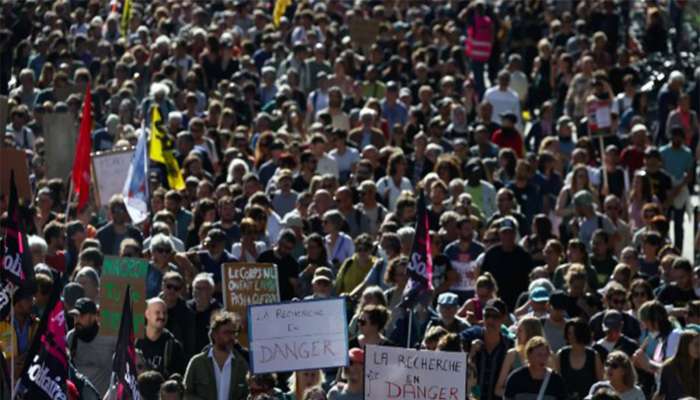
Paris: France witnessed large-scale anti-austerity protests on Thursday, with hundreds of thousands taking to the streets to oppose looming budget cuts and pressuring President Emmanuel Macron and newly appointed Prime Minister Sebastien Lecornu to change course, France 24 reported.
The nationwide strike action disrupted schools, rail services, hospitals, and pharmacies, as demonstrators demanded more investment in public services, higher taxes on the wealthy, and the reversal of a controversial pension reform that extended the retirement age. Teenagers also blocked dozens of high schools in solidarity with the labour movement.
"The anger is immense, and so is the determination. My message to Mr. Lecornu today is this: it's the streets that must decide the budget," said Sophie Binet, leader of the General Confederation of Labour (CGT). The union estimated one million people participated, while official figures placed turnout at around half that number, France 24 reported.
France's two largest unions, CGT and CFDT, warned the government against pushing forward with cuts, calling instead for a "socially fair" budget. "This is a warning, a clear warning to Sebastien Lecornu," said Marylise Leon, head of the CFDT.
Authorities deployed nearly 80,000 police and gendarmes nationwide, backed by riot units, drones, and armoured vehicles. Clashes broke out in Paris, Lyon and Nantes, where police fired teargas at protesters who threw stones and cans. The interior ministry reported more than 180 arrests. However, Interior Minister Bruno Retailleau stressed that "in almost all cases, marches and demonstrations took place under favourable conditions."
The disruption was felt strongly in transport, with regional train services heavily hit, though most high-speed TGV trains continued to run. One in three primary school teachers joined the strike nationally, and nearly half in Paris, according to the FSU-SNUipp union.
Lecornu, tasked with drafting next year's budget and building a new government, posted on X that he would meet unions "in the coming days," adding that demonstrators' demands were "at the heart of consultations I have initiated."
As reported by France24, France's budget deficit last year was nearly twice the European Union's 3 per cent limit. While investors are pressing for deficit reduction, opposition from unions and left-wing parties makes it difficult for Lecornu, who lacks a parliamentary majority--to secure support. His predecessor, Francois Bayrou, was ousted by parliament last week after unveiling a EUR44 billion austerity plan. Lecornu has yet to outline his approach but has indicated readiness for compromise.